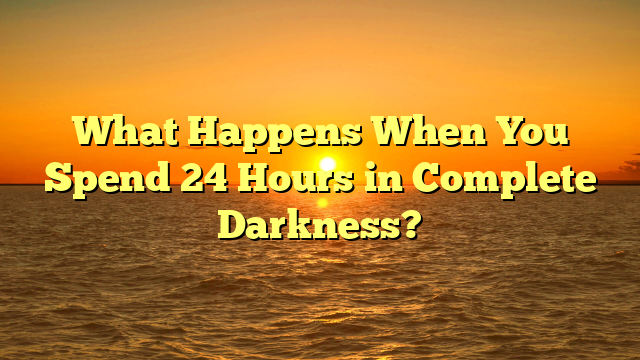## Plunging into the Void: 24 Hours in Complete Darkness and the Astonishing Effects on Body and Mind
Have you ever imagined a world without light? A world where the sun’s warmth and the moon’s gentle glow are completely absent? While most of us crave a good night’s sleep shrouded in darkness, spending 24 consecutive hours in total blackness is a drastically different experience – a profound sensory deprivation experiment that reveals hidden depths within our own biology and psychology. This isn’t about a simple power outage; this is about a complete absence of any visible light, a deliberate immersion into an environment designed to challenge our perceptions and push our limits. Let’s delve into what happens when you spend 24 hours in complete darkness.
### The Sensory Overload (and Deprivation) Begins
The initial impact of complete darkness is surprisingly jarring. Our eyes, accustomed to constantly processing visual information, struggle to adjust. Instead of seeing nothing, you initially experience a swirling, kaleidoscopic effect, as your brain tries desperately to make sense of the absence of visual input. This “dark adaptation” process, where your pupils dilate and your eyes become more sensitive to light, takes time. But even as your eyes adapt, the absence of visual cues throws off your sense of balance and spatial awareness. Suddenly, the familiar becomes alien, and simple actions like walking become challenging. This heightened sensitivity to other senses, like hearing and touch, is also noticeable. Every creak, rustle, and whisper becomes amplified, as your brain seeks alternative sources of information to navigate the void.
### The Circadian Rhythm’s Struggle
Our circadian rhythm, the internal biological clock governing our sleep-wake cycle, relies heavily on light. The absence of light completely disrupts this crucial mechanism. Without the usual cues from the sun, your body loses its sense of time. This can lead to feelings of disorientation and sleep disturbances, making it difficult to distinguish between day and night. You might find yourself experiencing periods of intense drowsiness, followed by bouts of unexpected wakefulness. This disjointed sleep pattern can leave you feeling exhausted and mentally sluggish. The lack of melatonin production, a hormone crucial for sleep regulation, further compounds this issue.
### The Psychological Impact: A Descent into the Self
Beyond the physical effects, prolonged exposure to complete darkness has a profound impact on the psyche. Many individuals report experiencing heightened introspection and a sense of heightened awareness of their inner world. In the absence of external stimulation, the mind turns inward, prompting a deeper exploration of thoughts, feelings, and memories. This can be both beneficial and challenging. Some individuals find this period of introspection therapeutic, leading to self-discovery and personal growth. Others, however, might experience heightened anxiety, feelings of isolation, and even hallucinations due to the sensory deprivation. The potential for psychological effects underscores the need for careful consideration and potentially professional supervision in such an experiment.
### Hallucinations and the Power of Suggestion
While not universal, hallucinations are a reported consequence of prolonged darkness. These are not necessarily vivid, fantastical visions but rather subtle distortions of perception. You might perceive faint lights or shadows that aren’t actually there, or hear sounds that are not present. These perceptual distortions are largely a product of the brain’s attempts to compensate for the lack of sensory input. The mind, starved of external stimuli, begins to generate its own, often reflecting existing anxieties or unconscious desires. This highlights the brain’s remarkable plasticity and its ability to create its own reality in the absence of external validation.
### Re-emergence into Light: The After-Effects
Finally, the moment of re-emergence into light is a profound one. The initial brightness can be intensely overwhelming, even painful to the eyes. The world, once familiar, now seems vibrant and intensely alive. This intense sensitivity to light can persist for several hours, even days, as your eyes and circadian rhythm slowly readjust to the presence of light. Beyond the visual effects, the psychological impact of the experience can linger. Many individuals report a renewed appreciation for light and a heightened awareness of their sensory perception. However, it’s important to note that the long-term effects of prolonged darkness are not fully understood, and further research is needed to fully grasp the implications.
### Conclusion: A Journey Inward
Spending 24 hours in complete darkness is a challenging yet potentially transformative experience. It’s a radical experiment that forces us to confront our reliance on visual cues and reveals the intricate interplay between our senses, our biology, and our minds. While it offers the potential for self-discovery and enhanced self-awareness, it’s crucial to approach such an undertaking with caution, considering both the potential physical and psychological impacts. The darkness, however, ultimately illuminates the incredible resilience and adaptability of the human body and mind. It reveals a capacity for introspection and survival that often remains hidden in the bright, bustling world we inhabit.

